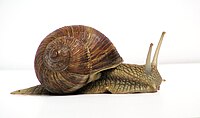
Back Slak Afrikaans ቀንድ አውጣ Amharic Kacomoli AMI Caragol AN حلزون Arabic حلزون (حيوان) ARZ শামুক Assamese Cascoxu AST Pimerikockwatcic ATJ Ch'uru Aymara
| Snails | |
|---|---|

| |
| A grapewine snail (Helix pomatia) | |
| Scientific classification | |
| Kingdom: | |
| Phylum: | |
A snail is a common name for a kind of mollusc. The term is used for a gastropod with a coiled shell. Their fossil records extends back into the Carboniferous period.[1]
Land snails and slugs breathe with a kind of lung. They used to be put together in a group, the Pulmonata. This was a well-known order in traditional taxonomy. However, the Pulmonata is polyphyletic.[2] This means the same life-style evolved in a number of different lines. This is called convergent evolution. Therefore, the Pulmonata is no longer an official term in biological classification.
The term "snail" is also sometimes used for aquatic snail-like gastropods, which usually have gills. Actually, most snail species are marine snails. There are more species of them, and they are far greater in numbers. Many kinds of snails can also be found in fresh water habitats.
Most land snails and slugs are herbivorous. Aquatic snails and slugs are usually omnivores or predatory carnivores.
In many countries around the world, people eat snails as a delicacy. In France, snails are called escargots, which is also the name of the dish. In French cuisine, the snails are cooked in salt water and then served with a garlic sauce.[3]
The biggest snail is the giant African snail. Their foot is up to 35 cm long. The fastest snail is the Helix aspersa. It can reach speeds up to 0.047 kmh. There are known more than 43000 species of snails all over the world.[4]
- ↑ (in Czech) Pek I. et al 1996. Základy zoopaleontologie. Olomouc. ISBN 80-7067-599-3.
- ↑ Jörger, Katharina M. et al 2010. On the origin of Acochlidia and other enigmatic euthyneuran gastropods, with implications for the systematics of Heterobranchia. BMC Evolutionary Biology 10 (1): 323. [1]
- ↑ "Snails as Food - Snail Facts and Information".
- ↑ Die lebende Welt der Weichtiere – Erstaunliches über Schnecken. Website of Robert Nordsieck. Abgerufen am 6. Juni 2014.